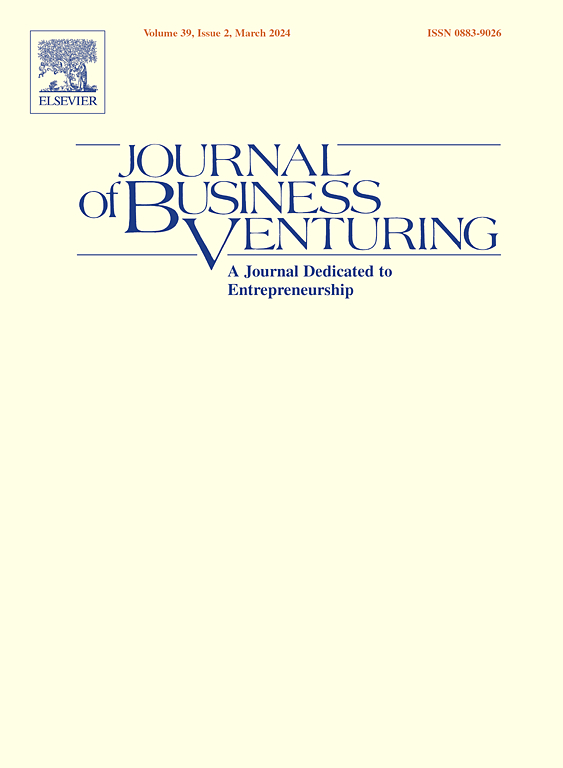衡量企业家使用启发式效果:情景判断测试(SJT)的开发和验证效果
IF 8.9
1区 管理学
Q1 BUSINESS
引用次数: 0
摘要
实效性是创业决策的关键理论。然而,衡量效果仍然具有挑战性。现有的测量方法使用自我报告量表,依赖于回忆和汇总不同的过去情况。这些措施不能捕捉有效性作为基于启发式的决策逻辑。利用应用心理学中关于情景判断测试(SJT)的现有工作的见解,我们开发并验证了一个效果SJT,该效果SJT捕捉了企业家在特定情况下使用效果的隐含性质。通过七项研究,包括一项为期14个月的前瞻性小组研究,我们建立了新的SJT对风险投资结果的结构、预测和增量有效性。从方法论上讲,这种新的有效性的SJT促进了新的研究类型,例如解开有效性的认知基础。从理论上讲,我们的研究通过利用认知科学中现有的启发式工作,为有效原则及其对风险结果的影响提供了新的概念清晰度。我们还将sjt作为一种新的价值方法引入到创业研究的特定流中。本文章由计算机程序翻译,如有差异,请以英文原文为准。
Measuring entrepreneurs' use of effectuation as heuristics: Development and validation of a situational judgment test (SJT) for effectuation
Effectuation is a key theory of entrepreneurial decision-making. However, measuring effectuation remains challenging. Existing measures use self-report scales that rely on recall and aggregate across diverse past situations. Such measures cannot capture effectuation as a decision-making logic based on heuristics. Leveraging insights from extant work on situational judgment tests (SJT) in applied psychology, we develop and validate an effectuation SJT that captures the implicit nature of entrepreneurs' use of effectuation in specific situations. Across seven studies including a 14-month prospective panel study, we establish the construct, predictive and incremental validity of the new SJT for venture outcomes. Methodologically, this novel SJT of effectuation facilitates new types of research, such as unpacking the cognitive underpinnings of effectuation. Theoretically, our study offers new conceptual clarity about effectual principles and their impacts on venture outcomes by leveraging extant work on heuristics in the cognitive sciences. We also introduce SJTs as a new method of value to specific streams of entrepreneurship research.
求助全文
通过发布文献求助,成功后即可免费获取论文全文。
去求助
来源期刊

Journal of Business Venturing
BUSINESS-
CiteScore
16.70
自引率
6.90%
发文量
59
审稿时长
77 days
期刊介绍:
The Journal of Business Venturing: Entrepreneurship, Entrepreneurial Finance, Innovation and Regional Development serves as a scholarly platform for the exchange of valuable insights, theories, narratives, and interpretations related to entrepreneurship and its implications.
With a focus on enriching the understanding of entrepreneurship in its various manifestations, the journal seeks to publish papers that (1) draw from the experiences of entrepreneurs, innovators, and their ecosystem; and (2) tackle issues relevant to scholars, educators, facilitators, and practitioners involved in entrepreneurship.
Embracing diversity in approach, methodology, and disciplinary perspective, the journal encourages contributions that contribute to the advancement of knowledge in entrepreneurship and its associated domains.
 求助内容:
求助内容: 应助结果提醒方式:
应助结果提醒方式:


